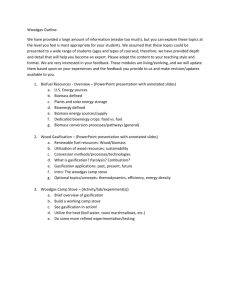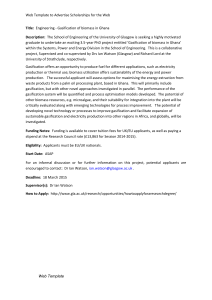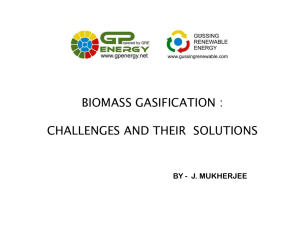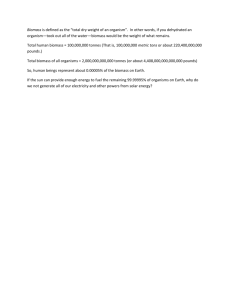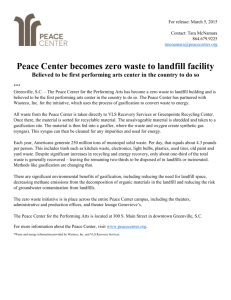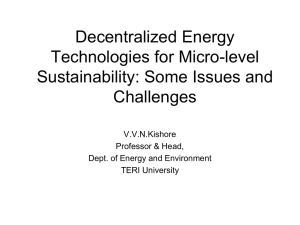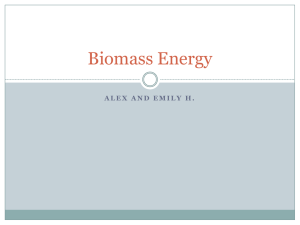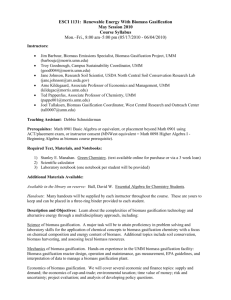Biomass gasification to fuels and chemicals
advertisement
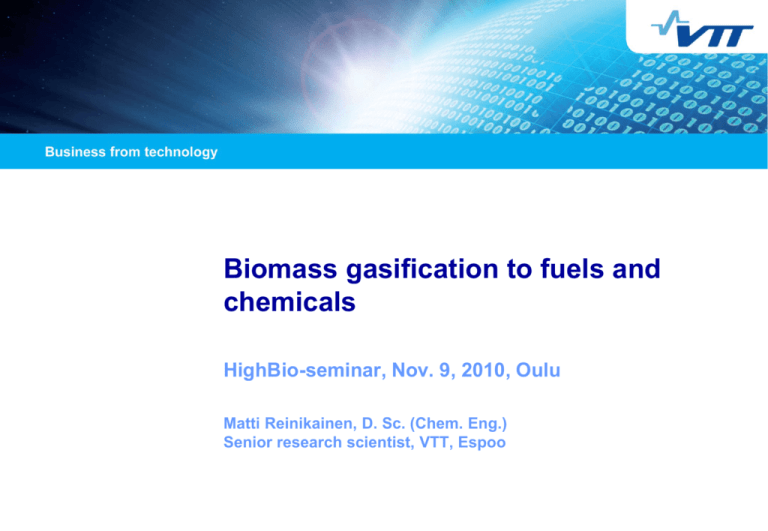
Biomass gasification to fuels and
chemicals
HighBio-seminar, Nov. 9, 2010, Oulu
Matti Reinikainen, D. Sc. (Chem. Eng.)
Senior research scientist, VTT, Espoo
2
GASIFICATION AND SYNTHETIC FUELS AT VTT
14 M€/year
40% customer projects
Over 15 patent families, 6 international patents and several license and
IPR agreements and well-focused IPR portfolio on fluidized-bed
gasification and hot gas cleaning
45 researchers, of which 20% hold a doctor’s degree
Excellent test facilities from laboratory to pilot scale
The leading research group in Europe in gasification and in fast
pyrolysis concept development. Coordination of over 10 EU and IAE
projects
Customers such as Neste Oil, Stora Enso, Corenso,
Metso Power, Nordkalk, Lahti Energia
3
Matti Reinikainen D.Sc.(Chem. Eng.)
Since1987 at VTT
1989-1991 AIST-fellow at NCLI in Tsukuba, Japan (C1-Chemistry
program, FT-pilot plant)
1995 STA-fellow at TNIRI in Sendai, Japan
1995 Licentiate's thesis on Co-catalysts for vapor phase
hydroformylation
1998 Doctor's thesis on Co-Ru-catalysts for FT-sythesis
1996-1999 superintendent of the synthesis pilot-plant (special
chemicals) at VTT
2000 - industrial contract research projects on catalysis
2006 moved to Gasification team
3
4
Synthesis gas route to fuels and chemicals
CATALYTIC PROCESSES
(Co, Fe, Cu, Zn, Ni, Rh, Ag…)
FT-DIESEL
NEW INNOVATIVE TECHNOLOGY
FUEL-FLEXIBLE
FLUIDISED-BED
GASIFICATION
• STEAM/OXYGEN
• PRESSURISED
GAS CLEANING
• TAR & METHANE
REFORMING
• FILTRATION
• DIRTY SHIFT
EXISTING & EFFICIENT
BUT EXPENSIVE
TECHNOLOGY
ULTRA
CLEANUP
FT-GASOLINE
FORMALDEHYDE
ETHANOL
ACETIC ACID
METHANOL
DME
SNG
MTG, MTO
HYDROGEN
FUEL
HEAVIER
ALCOHOLS
5
Biomass gasification to chemicals and fuels
Patents and open publications / year (y. = pat., g. = other publ.)
6
BIOMASS GASIFICATION PROCESSES
General 3D-View of the Research Landscape
Source: HCAplus database; Publications 1990 - 2010. Visualization by STN AnaVist.
7
BIOMASS GASIFICATION PROCESSES
”Methanol” highlighted (non-patents; green, patents; yellow
Source: HCAplus database; Publications 1990 - 2010. Visualization by STN AnaVist.
8
OPERATION CONDITIONS FOR CATALYTIC GAS CLEANING
IN BIOMASS GASIFICATION
N2, CO, CO2, CH4,
CxHy, H2, H2O
tar
500 - 15 000 ppm
NH3/HCN
300 - 10 000 ppm
H2S/COS
50 - 500 ppm
HCl
alkali metals
heavy metals
particulates 1 - 10 g/m3n
800 - 900 °C
N2, CO, CO2, CH4,
CxHy, H2, H2O
tar
~0
NH3/HCN
~equilibrium
H2S/COS
50 - 500 ppm
HCl
alkali metals
heavy metals
particulates 1 - 10 g/m3n
9
Biomass as a raw material for synthesis gas
In principal, syngas reactions are not dependant on the raw material,
but relevant differences still exist:
There is less experience about biomass gasification:
Biomass gasification plants are principally at least one order
of magnitude smaller than coal or natural gas plants
For instance: Shell-Pearl GTL-plant 140 000 bpd; 400 MW
BTL-plant ca. 4000 bpd
Gasification and gas cleaning constitute a decisive part of
the investment cost
Different kind of impurities (esp. tars)
Variation in the H/C ratio
Product upgrading (best product in small scale?)
10
11
Processes based on biomass gasification
Company
Country
Product
Chemrec AB
Sweden
DME;
Output [t/a]
Total investment Unit
Type
1 800
28 500 000 EUR
132 000
(Methanol)
250 000 000 EUR
demo
100 000 000 EUR
Chemrec AB
Sweden
methanol; DME;
CHOREN Fuel Freiberg GmbH & Co. KG
Germany
FT-liquids;
14 000
CHOREN Industries GmbH
Germany
FT-liquids;
200 000
CTU - Conzepte Technik Umwelt AG
Austria
SNG;
Cutec
Germany
FT-liquids;
ECN
Netherlands
ECN
under construction
2010
planned
2013
commercial
under construction
2009
commercial
planned
demo
operational
2008
0,02
pilot
operational
1990
SNG;
346
pilot
under construction
2011
Netherlands
SNG;
28800
Enerkem
Canada
ethanol;
375
Enerkem
Canada
ethanol;
4 000
Enerkem
Canada
ethanol;
30 000
70 000 000 CAD
Flambeau River Biofuels LLC
United States FT-liquids;
51 000
200 000 000 USD
Forschungszentrum Karlsruhe GmbH
Germany
GTI Gas Technology Institute
United States FT-liquids;
NSE Biofuels Oy, a Neste Oil and Stora Enso JV
Finland
FT-liquids;
656
NSE Biofuels Oy, a Neste Oil and Stora Enso JV
Finland
FT-liquids;
100 000
Range Fuels, Inc.
United States mixed alcohols;
Range Fuels, Inc.
United States ethanol; methanol;
Research Triangle Institute
United States FT-liquids; mixed alcohols;
Southern Research Institute
United States FT-liquids; mixed alcohols;
Tembec Chemical Group
Canada
ethanol;
Vienna University of Technology
Austria
FT-liquids;
diesel; gasoline type fuel;
576
pilot
Status Start-up Year
demo
pilot
demo
commercial
planned
operational
2003
under commissioning
2009
announced
pilot
planned
608
pilot
under construction
26
pilot
under construction
2009
demo
under construction
2009
commercial
pilot
300 000
22
13 000
0,20
commercial
2012
planned
operational
2008
under construction
2010
3 000 000 USD
pilot
planned
40 000 000 USD
pilot
operational
demo
operational
pilot
operational
Alico
NewPage
Lähde, TUW
2005
12
Thermochemical / biochemical hybridprocesses
Company
Country
Product
Output [t/a]
Coskata
United States ethanol;
120
Coskata
United States ethanol;
300 000
Coskata
United States ethanol;
Iowa State University
United States
ZeaChem
ethanol; FT-liquids;
biodiesel; pyrolysis oils;
ethanol; mixed alcohols;
United States
various chemicals;
200
4 500
Total investment Unit
Type
demo
400 000 000 USD
18 000 000 USD
commercial
Status Start-up Year
under construction
2009
planned
pilot
operational
pilot
under commissioning
2009
pilot
announced
2010
Abengoa
ICM
Lähde: TUW
13
Required gas purity levels
Source: NREL 2003
14
Chemicals from methanol
Several important commercial processes:
Formaldehyde
Acetic acid (Monsanto-process)
MTBE
DME
Methylhalides
CH3OH +
Gasoline
hydrocarbons
ZSM-5 zeolite-catalyst
Also possible to produce gasoline with MTG-process (New Zealand)
15
MTG-process, TIGAS
Developed by Haldor Topsøe
Methanol/dimethylether synthesis and the
subsequent conversion into gasoline are
combined in a single synthesis loop
Flexible to the variation in H/C-ratio of the
syngas
Desired conversion attained at a fairly low
pressure level
16
MTG-processes, TIGAS
8.12.2009 Topsøe published their plan to construct a demo plant in
Des Plaines, USA.
Fuel 25 t of wood / d
Demonstartion for industrial scale of 1000 t wood / d.
Energy efficiency ca. 60%.
Partners UPM-Kymmene and Conoco-Phillips.
”This is the last step before the technology will be made
commercially available.”
17
Alcohol mixtures
Preferably higher alcohols, e.h. butanol
Good as a gasoline component
Biochemical routes
Catalytic route from synthesis gas
Direct route (modified methanol catalyst, sulphided Mo-catalyst...)
Olefinic FT-product => (Heterogeneous) hydroformylation
Safol-23-process
18
Selectivity of Co2(CO)8 based catalysts
Selectivity, C-%
30
CO conversion, %
25
25
20
20
15
15
10
10
5
5
0
none Mg
Ca
Sr
Ba
Li
Promoter
Na
K
Rb
Cs
0
Ethanol Acetic acid Acetaldehyde Other oxygenatesCO conversion
Promoted Co2(CO)8/SiO2. T=523 K, P=2.1 MPa,
GHSV=2000 h-1, CO:H2:Ar=3:6:1. The loading of
the promoters was 25 mmol/100g with the
exception of 43 mmol/100g for Li and 200
mmol/100g for Sr.
Selectivity, C-%
14
12
10
8
6
4
2
0
SiO2 SiO2-K Al2O3
CO conversion, %
20
15
10
5
TiO2
ZrO2
MgO
ZnO La2O3 CeO2
Support
Ethanol Acetic acid Acetaldehyde CO conversion
• The effect of support on the CO hydrogenation
activity of Co2(CO)8 based catalysts with metal
loading of 5 wt.-%. T=523 K (493 K for Al2O3 and
ZnO), P=2.1 MPa, GHSV=2000 h-1,
CO:H2:Ar=3:6:1.
0
19
Process Scheme for Production of FT Liquids
Oxygen
Oxygen
plant
Recycle gas
Steam: 0.33 kg/ kg
of dry biomass
Moist
feedstock
Dryer
Gasifier
HP
Steam
HP
LP
Steam Steam
HT
Shift
Reforming
Heat
Combustor
FT reforming loop
HP Steam
Scrubbercooler
MP Steam
LP Steam
FT off-gas (purge)
Regenerative
Absorber
FT synthesis
CW
Separator
FT primary liquids (C5+)
CW
Exceptionally high recovery
of exotherm as steam
H2O
20
Challenges of the Fischer-Tropsch-reaction
The selectivity of the FT-reaction is intrinsically bad and only to the admen the reaction product
is simply ”diesel”
The product is always a complex mixture and it is necessary to find good use to all of the
components
The necessary catalysts (Co, Ru, Fe) are very sensitive to sulphur
The reaction is highly exothermic and one must utilise the reaction heat
Source: Shell
α=0.85, Co-catalyst,
neutral Al2O3-support
T=200°C
α=0.61, Co-catalyst,
acidic Al2O3-support
T=250°C
21
Thoughts on a possible research subject
”Badly selective FT-reaction
Aimed at a light FT-products, e.g. (27 % C1-C4; 50 % C5-C12; 16 %
C13-C18, 7 % > C18
Fe-catalyst which is not so sensitive to sulphur
Save in the cost of final cleaning of the gas
Once through process – no hydrocracking
Easier to control the reaction heat than in the manufacture of
wax
Reforming of the gas is easier since it is not necessary to attain
full methane conversion
Methane can possibly be used as SNG. Other light
hydrocarbons and the heaviest fraction as energy
Olefins used possibly as chemical raw materials
22
SYNTHESIS GAS FROM BIOMASS
Biorefineries at pulp and paper mills
and at large CHP plants
- diesel production: 70 -150 000 tons/plant
- by-product heat for process steam or
district heating
- high overall efficiency
FROM R&D TO INDUSTRIAL SUCCESS
First synfuel production plant
- 200-250 MW feed capacity
- 105 000 tons/a diesel fuel
- 3 % Finnish transport fuel
- start-up in 2012-14
Peat
ammonia
plant
Oulu/Finland
Biomass/waste
gasification for power
(Lahti, Corenso,
Värnamo, Kokemäki)
1985
Synthesis gas
R&D in Europe
and USA in 1980’s
1995
2000
R & D on hot filtration
and
catalytic gas cleaning
2005
New applications
Industrial demonstration: 10-50 MW
- fuel cells, 2nd gen. IGCC
- hydrogen or methane
- renewable chemicals
- replacement of oil/gas
- start-up in 2009
2010
2015
2020
Further R&D
VTT-UCG
Optimised
syngas R&D
& PDU-scale
development
- process optimisation
- waste gasification
- hydrogen technologies
2025
2030
23
OPTIONS FOR FOREST INDUSTRY ?
- benefit of raw material, biorefinery and large scale operation -
Paper and
Market pulp
Pulp &
Paper Mill
Power
Heat
< 500 MWf
BioPower
Bark
boiler
Power
Steam
Wood
Wood
handling residues
Forest biomass
in future also
urban waste and straw
- Southern hemisphere
plantations
Optional Biofuels:
(pellets)
bio crude
EtOH/MeOH
BioDiesel
Biofuel production
< 400 MWf
Crude Oil
Refinery
24
Co-Production of Syngas Derivatives at Pulp and Paper Mills
BEFORE INTRODUCTION OF FT PLANT
Power-Boiler Energy flows (LHV basis)
Wood for fibre,
purchased fibre
Black liquor
P&P products
Electricity
Bark, etc
151 MW
Purchased biofuel
Power
boiler
31 MWe
100 MW
Primary heat
25
Co-Production of Syngas Derivatives
at Pulp and Paper Mills
AFTER INTRODUCTION OF FT PLANT (260 MWfeed)
Integration of steam system in conjunction with power boiler rebuild
Secondary heat used for biomass drying
Energy flows (LHV basis)
Wood for fibre,
purchased fibre
Black liquor
P&P products
Electricity
Bark, etc
25 MW
285 MW
Purchased biofuel
25 MWe
Power
boiler
21 MWe
100 MW
Primary heat
260 MW
Purchased electricity
FT
plant
FT primary liquids
161 MW
26
Co-Production of Syngas Derivatives at
Pulp and Paper Mills
NET CHANGES WITH INTRODUCTION OF FT PLANT (260 MWfeed)
Integration of steam system in conjunction with power boiler rebuild
Secondary heat used for biomass drying
Incremental energy flows (LHV basis)
Wood for fibre,
purchased fibre
Bark, etc
Black liquor
+ 134 MW*
Purchased biofuel
Integrated
Pulp and
Paper Mill
or
Stand-Alone
Paper Mill
P&P products
* 134 MW = (285 – 151) MW
** 35 MW = (31 – 21 + 25) MW
FT primary liquids
Purchased electricity
+ 161 MW
+ 35 MWe**
Nominal overall efficiency = 100 x 161/(134 + 35/0.4) = 73 %
(purchased electricity generated from biomass at 40 % η)
27
Estimated Overall Efficiencies
Efficiency = 100 x [LHV-energy of main product + high-grade byproduct energy - {electricity / 0.4}]
/ [LHV-energy of as-received feedstock]
Overall Efficiency, %
100
80
Primary
energy out
Main product
60
40
(Electricity in)
/ 0.4
20
0
-20
-40
FT
CH3OH
SNG
H2
Integration benefits: large for FT; significant for CH3OH; negligible for SNG; minor for H2
Notes: (1) Feedstock drying: from 50 % moisture to 30 % with secondary heat; from 30 % to 15 % with
by-product steam. (2) FT: Fischer-Tropsch primary liquids; reforming loop included.
28
Estimated (Equivalent) Biomass-to-Pump Costs
260 MWfeed; Feedstock at 10 EUR/MWh; Interest on capital 10 %, 20 a
Costs, EUR/MWh
100
Vehicle-related extra
costs
80
Distribution costs,
incl. pressurisation for
SNG
Upgrading costs (FT)
60
40
Production costs
20
0
FT
SNG
Equivalent Biomass-to-Pump Costs: Biomass-FT < Biomass-SNG
(and most probably Biomass-FT << Biomass-H2-FC!)
29
Finnish biodiesel projects
Background: National UCG-project: budget 4 MEUR, duration 2004 –
2007
Wide industrial consortium: Foster-Wheeler, Neste Oil, Andritz-Carbona,
Vapo, PVO, UPM, M-real, Metsä-Botnia and Stora-Enso
Three Finnish consortia have published their biodiesel projects based on
F-T-technology:
Neste Oil + Stora Enso → NSE Biofuels Ltd- joint venture
UPM + Andritz/Carbona (+GTI)
Vapo + Metsäliitto
30
NSE Biofuels Demo 1 plant in Varkaus
Biomass
Dryer
Kuivuri
Silo
12 MW
Gasifier
1. Commissioning as air blown lime
kiln gasifier
2. Testing period as O2/H2O gasifier,
gas cleaning, FT tests
3. Return to lime kiln gasifier
From Neste Oil and Stora Enso
5 MW
Gas cleaning
and FT
Lime
kiln
31
UPM’s 2G BTL Concept
Synthetic
H2+CO
Biomass
Gasification
drying
& purification
& up-grading
Water
CHP
treatment
plant
Bark
Stumps
FT-synthesis
Residues
biodiesel
CnH2n+2
Gas Technology Institute, Des Plaines, Illinois, US
Paper mill units
Additional units
Wood
Pulp & paper mill
sourcing
Pulp,
wood
from: UPM
Material flow
Energy flow
32
33
UCGFUNDA 2008 - 2011
Biomass gasification for synthesis applications
- fundamental studies supporting industrial development projects
VTT, TKK and Åbo Akademi, total budget 1.5 M€
Financing by Tekes Biorefine, VTT and private companies
(Carbona, Foster Wheeler, Metso Power, Neste Oil, Stora Enso, UPM &
Vapo)
Biomass characterisation for pressurised steam/oxygen-blown gasification:
ash behaviour and reactivity
Filter blinding and catalyst deactivation studies
Tar reactions in non-catalytic and catalytic processes
System studies on BTL-applications and hydrogen production
Development of measuring methods for tars and other gas contaminants
IEA groups: ”Biomass thermal gasification” and ”Biomass Hydrogen”
34
On-line analysis of tars, water and ammonia
35
'Rapid' on-line tar
analysis
Analysis time 15-20 min
Calibrated compounds:
Benzene
Toluene
Naphthalene
Phenanthrene
Anthracene
Fluoranthene
Pyrene
Gas phase samples on-line
The results have been in good
agreement with the results from
off-line analysis off the
corresponding samples.
Especially useful in transient
conditions where the gas
composition changes quickly.
mg/m3
3000
2800
2600
2400
2200
2000
1800
1600
1400
1200
1000
800
600
400
200
0
26.8.2008 20:24
Naftaleeni
Results from BiGPower tests:
air-blown CFB gasification
followed by tar reformer
26.8.2008 21:36
26.8.2008 22:48
27.8.2008 0:00
Tolueeni
Bentseeni
27.8.2008 1:12
27.8.2008 2:24
27.8.2008 3:36
27.8.2008 4:48
27.8.2008 6:00
27.8.2008 7:12
36
Recent trends based on projects and literature
Fischer-Tropsch BTL-concepts are very similar in the synthesis
step. Product is only ’diesel’.
MTG-route (Methanol To Gasoline) is gaining more interest
Haldor Topsøe’s TIGAS-process is in demonstration step
Skive Fjernvarme (methanol- and methanol to gasoline-process
Chemrec’s black-liquor based process
GTI
Ethanol from synthesis gas is a popular theme in Japan
Thermochemical route to butanol and mixed alcohols wait for an
efficient catalyst
37
Summary
Biofuels are limited by the available raw material – they can not solve the
energy problem
Diesel is not the only possible end product
Total efficiency about 90 % if process thermally integrated, otherwise
below 60 % -> importance of integration
There are plenty of functional options -> complex task to optimize
Raw material, size of plant, integration to other processes, political
decisions
Synthesis gas must be clean and contain a suitable H2/CO ratio
Primary product is has to be upgraded
One must find economical use to all product fractions and reaction heat
Plenty of development needs in gasification, gas cleaning as well as
synthesis steps: solutions for small scale; heat removal from process;
catalyst activity, selectivity and stability; uprading of products…
